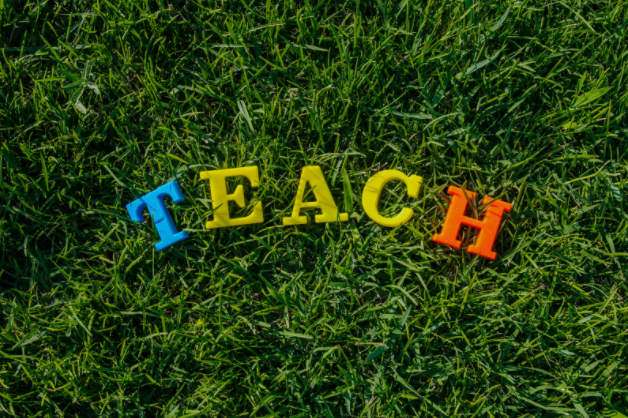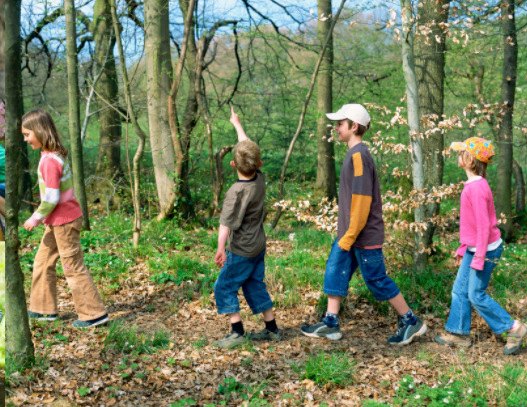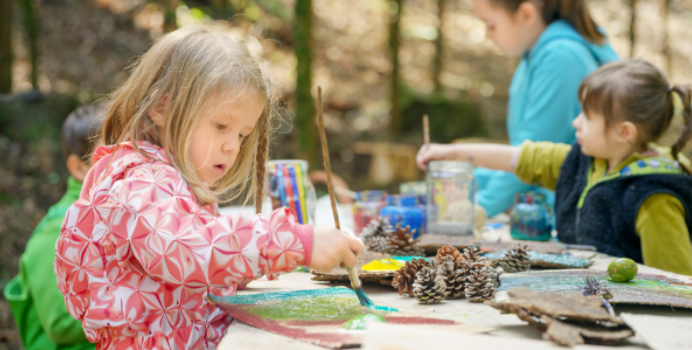By: Laura Nicolas,https://mapetiteforet.fr and Sologna Nature and Culture http://sologna.fr
Nature-Based Learning, Outdoor Learning, Outdoor Education, Forest School Education…the English speaking world offers rich examples of nature-based educational trends ! What about France?

A progressive shift from traditional French teaching pedagogies
As a French educator and researcher, I cannot find here, in France, any equivalent of the materials created by my British and North American colleagues. Nevertheless, several recent books have been written in French in the last five years that address these topics, some which include:
-
"Emmenez les enfants dehors" (“Bring Children Outside!), Crystèle Ferjou, 2020
-
“L'école à ciel ouvert” (“The Open-air School”), SILVIVA, 2019
-
“L'enfant dans la nature” (“The Child in Nature”), Matthieu Chéreau et Moïna Fauchier-Delavigne, 2019
-
Tous dehors en Forêt” (“Everyone Outside in the Forest!”), Patrick Luneau, 2018
-
“A Guide to Open-Air Schools” (Eco-Conseil), 2018
-
“Let Them Climb Trees” (Louis Espinassou), 2010
-
“Children in the Woods” (Sarah Wauquiez), 2008
Undoubtedly, these books announce a real shift in French national educational trends with two major dimensions :
- Taking kids outside. French society, and more precisely, the French national educational system, is far from having the same level of concern for outside education compared to Canada, the USA, or even its closest European neighbors such as England, Germany, and Switzerland. It is true that since the beginning of the 19th century, France has inherited a European tradition of summer camps and school study trips. (The ‘summer camp’ phenomena actually expanded at the beginning of the 20th century to help prevent the spread of tuberculosis and other respiratory diseases.) But those activities are considered additional and recreational. They are not – or not totally – considered part of the educational process. That is to say that these outdoor pursuits are not viewed as part of a serious academic education, the one where you study inside a building, seated in a chair. Children in many French schools actually remain sitting and silent for hours during the days. They take recreational breaks in the schoolyard where, most of the time, there is no vegetation. And sport is being taught inside a gymnasium.

-
Teaching differently. France has a long tradition of educational movements such as the socalled “new pedagogies” or “alternative pedagogies” (EX. Montessori or Freinet). But it seems that there is a huge gap between those private (and expensive!) schools and the public school system. Even if the approaches invented by Montessori teachers are used more and more by teachers and parents, the educational system itself does not change.
-
From my perspective, the most common way of teaching remains the following: teacher explains or shows the things to learn or do, and then asks students to learn or do it. Even if feedback practices and socio-constructivist attitudes are far more common now than ever, very little has changed in approaches to French instruction since the end of the 19th century. This way of teaching and learning is rooted in the historical tradition of seeing the world through an intellectual prism only.
The nature-based education movement is moving forward regarding both of these two specific aspects. Through the books I mentioned before and through several initiatives started by teachers in French schools, change is now happening. Today, we can describe the movement as following :
-
Increasing media coverage: more and more media outlets (blogs, websites, podcast channels and TV channels) are addressing the nature-based education movement;
-
Strong support from foundations such as Fondation Nature et Découvertes which supported the creation of hundreds of forest schools projects the past ten years;
-
The recent creation of a network aimed at promoting nature-based teacher training, not only through a private programs but also through public education;
-
The exponential growth of nature-based education initiatives everywhere on the French territory.

Forest Schools, the French Way
Most French proponents of nature-based learning find inspiration in the British model of Forest schools, since many can attend training offered in the United Kingdom by British experts in the field. I must say that the focus that has been made by the French government and in the media most recently is on the preservation of forested environments in France. French educators have become increasingly interested in the concept of Forest school as a result. The Scandinavian model is also renowned in France. Still fewer educators get inspiration from other models, such as Adventure Education. This is largely because many educational models are not translated into French language.
What Does This Mean for French Forest Schools in Practice?
Most forest schools have been created by individual associations that have private status. 90% of them do not have full-time school enrollment. They typically offer parents the possibility to come with their kids to spend time in a forest. This place is dedicated to pedagogical activities, most of them related to environmental education (getting to know trees, plants and animals, etc.).
A few forest schools (less than a dozen) are full-time schools where children spend all their time outside where they learn math, languages, sciences, etc. in the forest. Those schools usually are what we call “under State contract”, which means that they follow the national educational curriculum. [In the United States, this is akin to “State-licensed” schools.]
A significant number of public school teachers take their class outside or design the schoolyard to carry out typical activities of outdoor education: manipulating natural elements, playing with loose parts, learning how to count or write using pieces of woods or stones, creating art pieces with those elements, etc.
For more details about the geographic locations of French Nature-based Learning Initiatives, see the Réseau Pédagogie par la Nature map here.
I’m currently addressing the problem of the lack of translation from English to French languages by offering translations of English written materials to French, on the website Ma Petite Forêt.

This variety of places, processes, and status combines with another kind of variety: the pedagogical differences in implementation. Indeed, outdoor education is what educators decide to make of it! Here are some ways French educators undertake outdoor activities :
-
Some teachers take children outside to play. They only carry out unstructured play. This means that there is no pedagogical program. It does not mean, of course, that there is no learning. But learning is not focused on a specific subject nor evaluated by teachers.
-
Some teachers consider the outside world as THE place to experiment with art and creativity. They use the environment as a dedicated place for all creative activities, but will not experiment with other subjects or learning outside.
-
Some teachers only lead environmental or science-based activities outside such as discovering trees, plants and animals ; learning about environmental issues, etc.
-
Some teachers take children outside and reproduce what they do inside the classroom. They have kids sit down around them and carry out a reading activity, for instance.
-
Some teachers carry out what we call “activités didactiques”, which means that they bring children to learn specific skills and knowledge (according to the children’s ages and profiles) corresponding to national program [curriculum standards]. They may include unstructured play and other typical activities from outdoor education, but always keep the program [required curriculum standards] in mind.
The beauty of this young movement, nature-based education, in the French context is that it is deeply engaging and motivating. Educators and parents are enthusiastically inventing, experimenting, and learning each time they take kids outside. The current lack of structured initiatives previously described should not intimidate those who are interested in this kind of pedagogy. More structured approaches may happen in the following years. It will surely happen when teacher training is put in place.
As French nature-based learning initiatives take hold, my hope is for a future where teachers will :
-
stay in touch and aware of what is happening at home and abroad in this movement,
-
keep learning and remain enthusiastic about the wonderful benefits of nature-based education,
-
not confuse needed organization of nature-based schooling initiatives with a complete homogenization or standardization of forest schooling, which would lead to less autonomy and less inspiration for daily outdoor learning.
Laura Nicolas is a teacher, an educator and a university lecturer at Paris Est Créteil University. She also founded the association Sologna Nature et Culture which aims to support outdoor education. She is also the founder of Ma Petite Forêt dedicated to nature-based education in France.
.png)